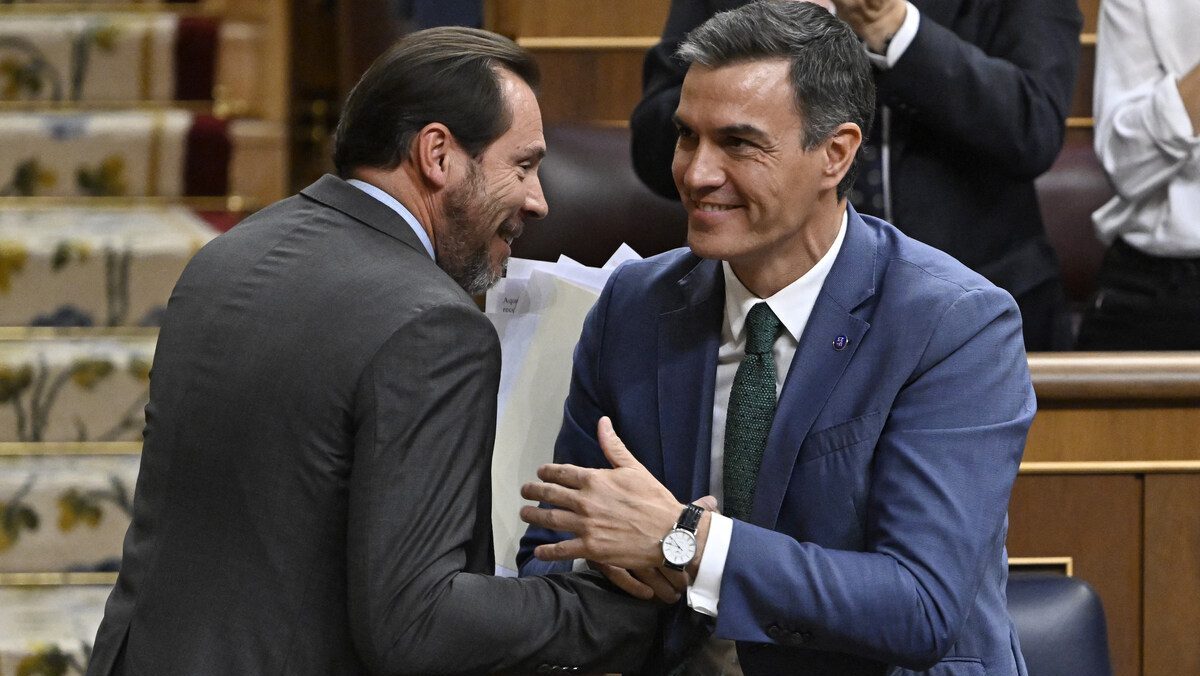
Spanish acting Prime Minister Pedro Sanchez (R) congratulates Socialist group deputy Óscar Puente for his reply to the candidate for prime minister, Alberto Nunez-Feijoo, at Las Cortes in Madrid during the first session of a parliamentary debate to vote through a prime minister.
Photo by JAVIER SORIANO / AFP
In Spain’s parliament, the debate and first attempt to form a government ended as expected—in failure.
Alberto Nuñez Feijóo, leader of the center-right Partido Popular, lost the vote on his prime ministership by the expected four votes.
The two days of discourse preceding the vote, though, presented a perfect picture of Spain’s current political situation.
In his two-hour discourse that started the debate, Feijóo positioned himself as the conciliator of a divided nation and guarantor of the legacy of Spain’s transition from dictatorship to democracy in the 1980s following the death of autocrat Francisco Franco. The decades of the 80s, 90s, and aughts have become a touchstone of both social nostalgia and political credibility in a country mired in economic stagnation and rife with social-political divisions where, under now-acting Prime Minister Pedro Sánchez, the country’s institutions have lost credibility as politically independent.
In this context, the biggest surprise of the debate hits home harder.
The debate should have served as an intense face-to-face between Feijóo and Sánchez, who was widely expected to deliver his party’s response to Feijóo.
Shock shook the Congress of Deputies, though, when a low-profile member of Sánchez’s socialist party took the podium.
Óscar Puente only recently arrived in the congress as he had been the mayor of the regional capital of Valladolid until May. He won that round of local elections, but lost the mayor’s office to a pact between the PP and VOX that left his party and its political friends outnumbered. The message was clear: Feijóo, too, technically won the general elections in July but stands to be outnumbered by a pact on the left. What’s sauce for the goose is sauce for the gander.
With evasive statements to the press, the PSOE had carefully hidden their plan, precisely for its shock value. As soon as his speech began, journalists got the explanation on their phones. The choice of Puente was “a way to put in front of the mirror all the contradictions of the leader of the PP.”
Sánchez himself did not intervene at all during the debate, including only bothering to be present in the chamber for half of the second day of interventions— so much respect does he have for the democratic process.
He remained the elephant in the room, nevertheless.
VOX leader Santiago Abascal offered his consolation to Feijóo during his intervention, chalking up the PP leaders’ naivete—he was visibly disappointed by Puente’s appearance—to his lack of direct experience with the acting prime minister. Abascal has indeed spent several more years in the national parliament compared to Feijóo’s more recent arrival as his party’s national president.
Abascal dedicated most of his thirty-minute reply to Feijóo to “painting the picture of the worst government in the history of Spain,” referring to Sánchez’s last four years in power. The enemy, he said, was Sánchez.
In his response to Abascal, Feijóo maintained his position as a conciliator.
“I will speak with VOX even if it bothers the socialists and I will speak with the socialists even if it bothers VOX,” he said.
In their various speeches throughout the debate, neither Feijóo nor Abascal could resist repeating their mutual allegations that the other was to blame for the weak election results for the Right. Overall, though, the two leaders had a more friendly tone than during the July campaign.
One more vote on Feijóo’s possible government will be held on Friday. This time, he will need only more yes than no but a victory will still require a miracle.
